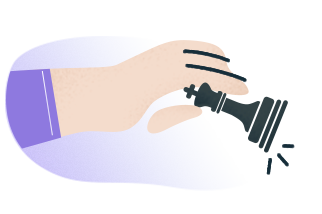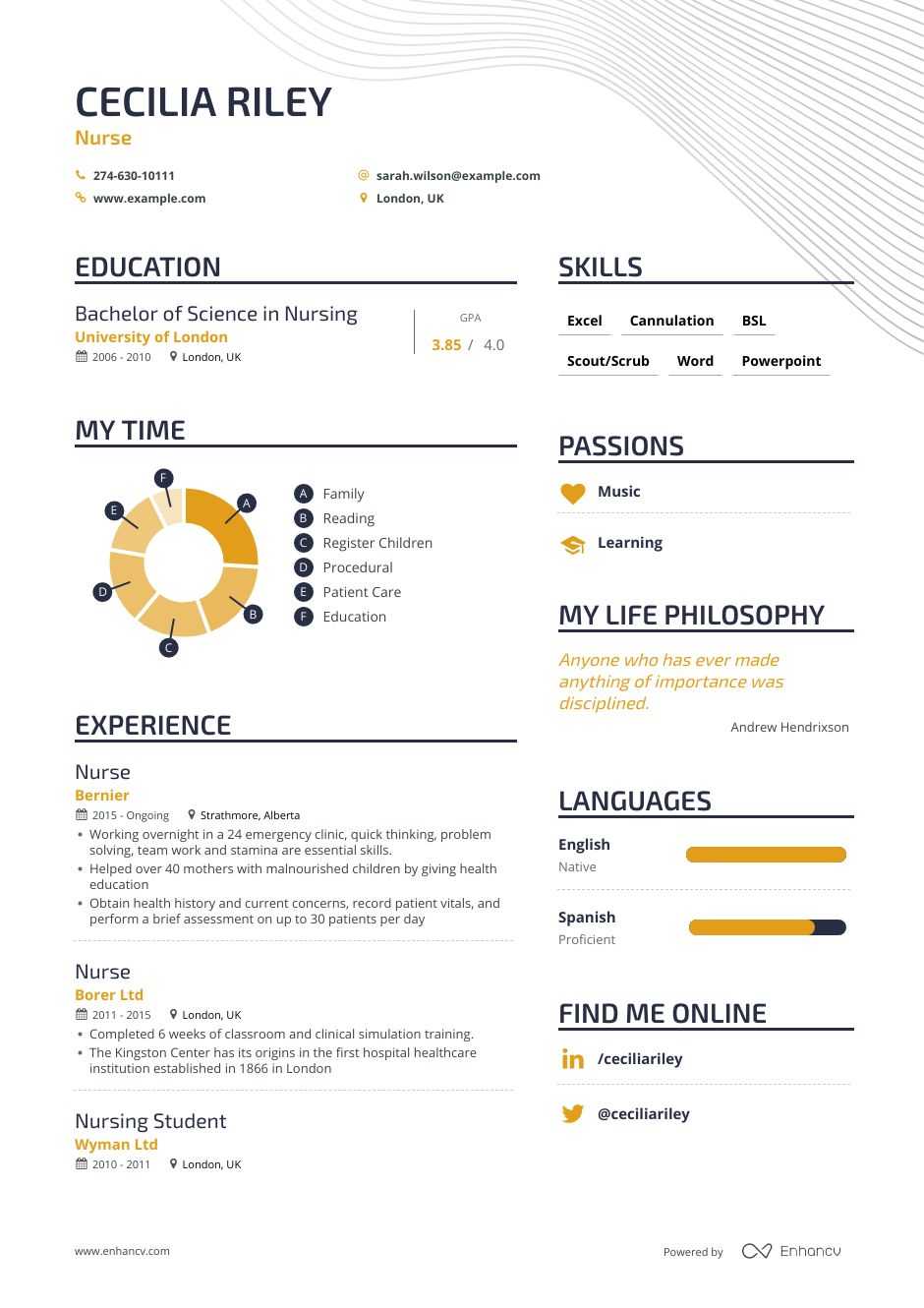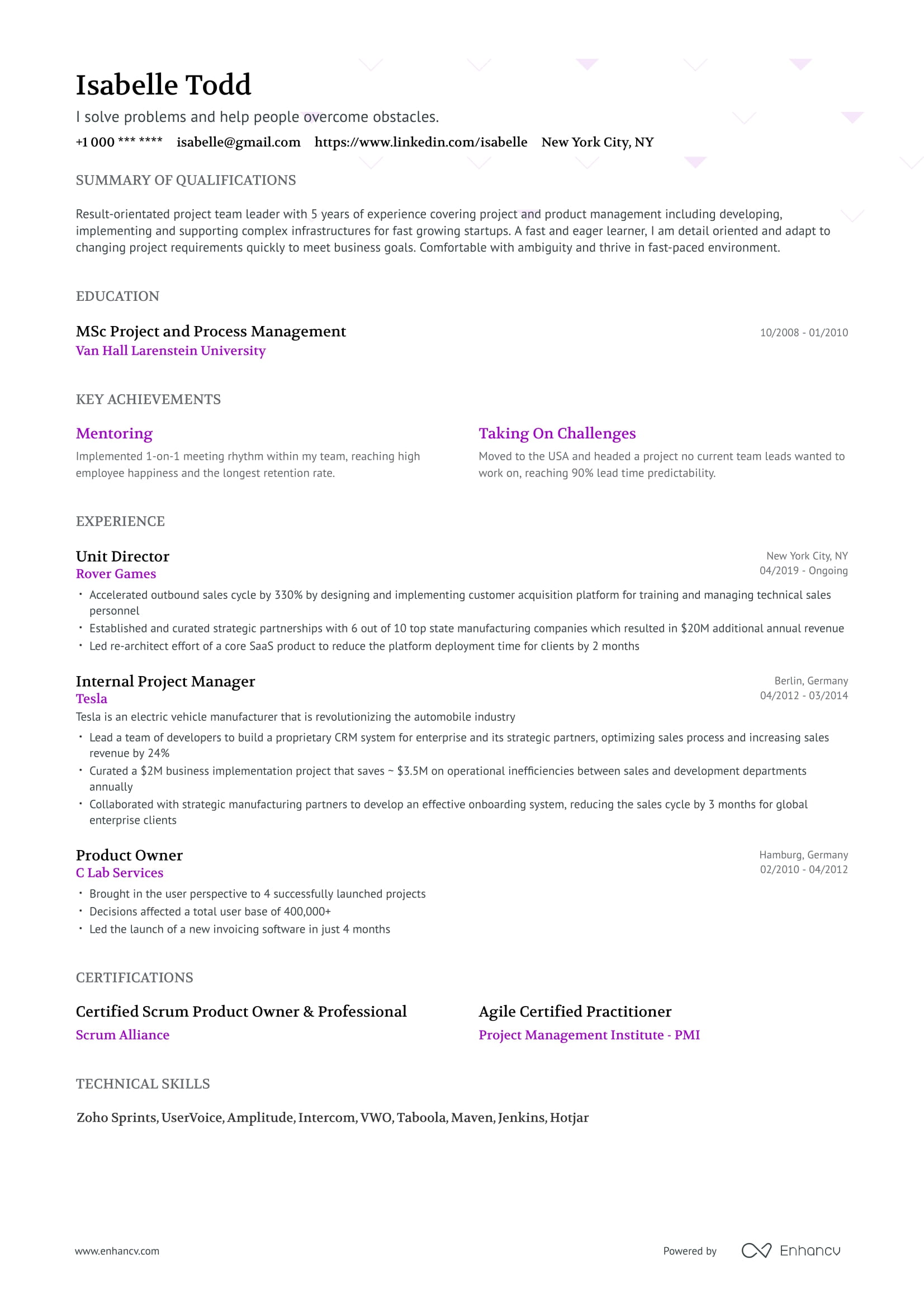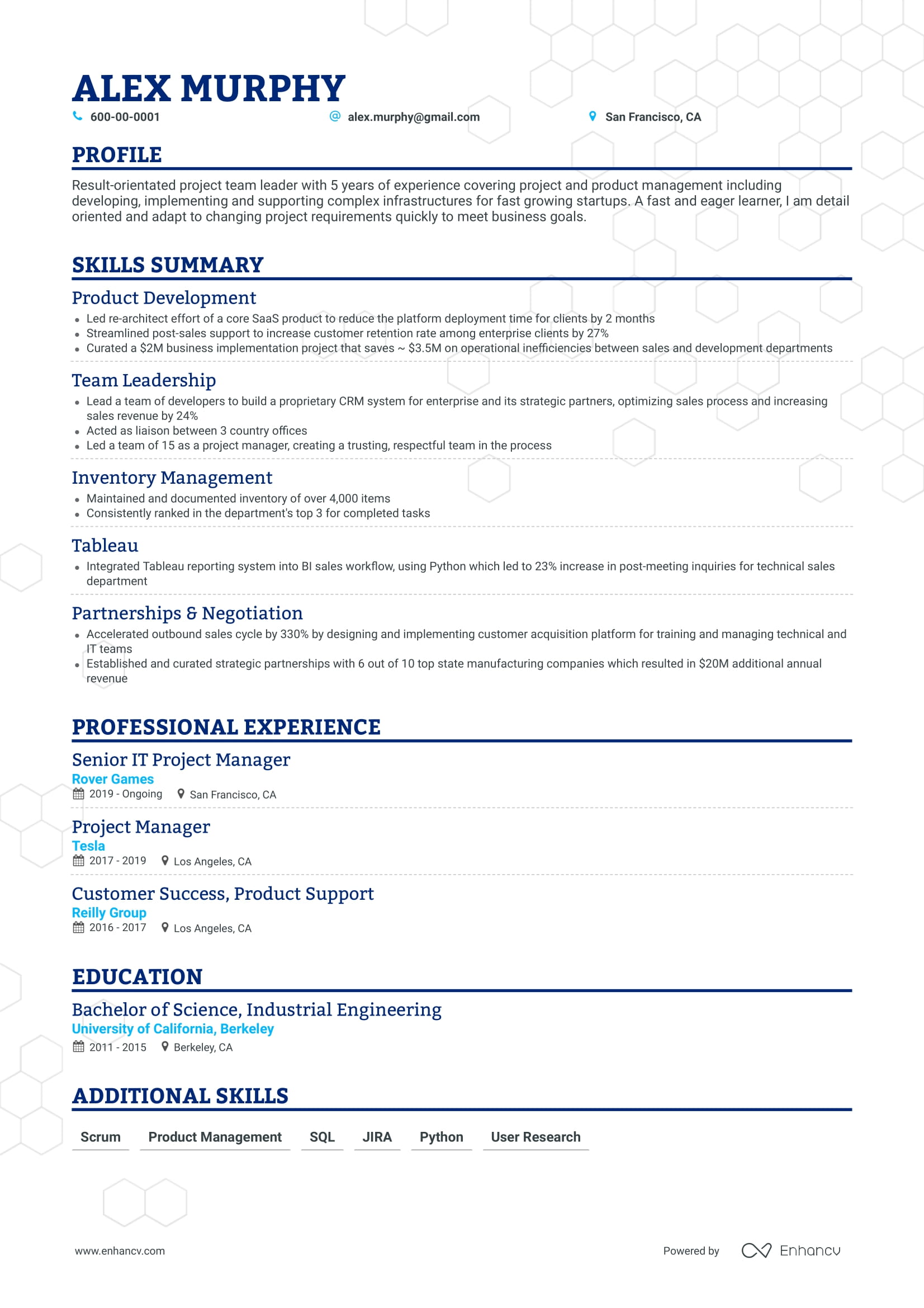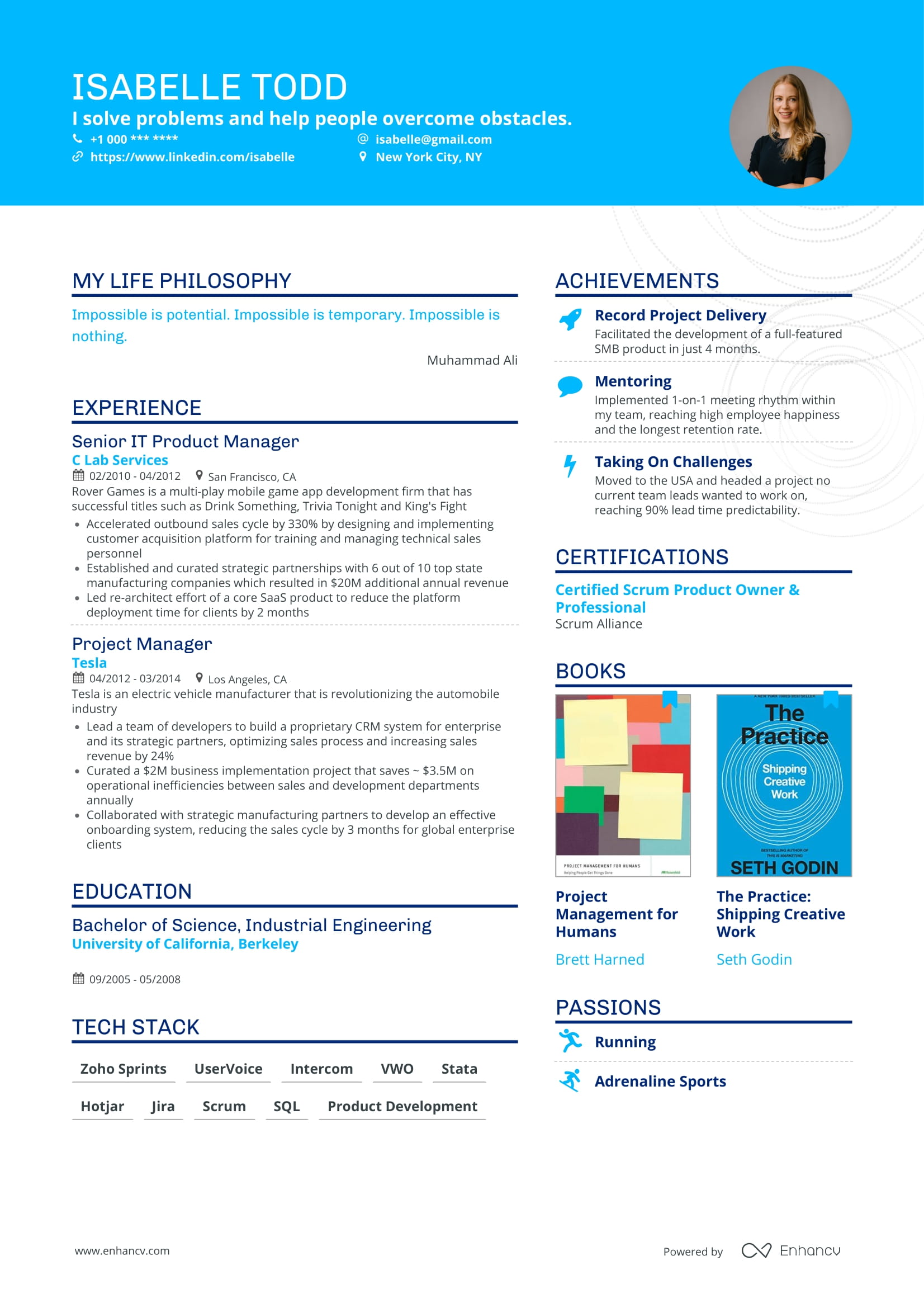Example Nurse Resume - Browse more resume templates and build a stand-out resume
Here it is, all the information you need to write the best nursing resume in one place.
You have trained for years.
You’ve been certified as an RN or maybe you’re a student?
You may have years of nursing experience or none at all.
The bottom line is you care about people.
But do you care about your resume?
Well we’re going to show you why you need to.
Here’s a nursing resume sample & how to use our resume builder
In this guide you’ll learn how to create a nurse resume:
- How to write a nurse resume with no experience
- How to include nursing certifications on a resume
- How to show your bedside manner by adding personality to your nursing resume
- Great examples of a nursing resume summary
Try one of our FREE nurse resume templates:
Start by creating a nursing resume outline
Just like organizing a patient plan, it helps to start your resume by mapping out what sections you’ll need.
Here’s the most common nurse resume outline:
- Objective
- Medical Experience
- Education
- Soft Skills
- Technical skills
- Interests
- References
Understanding that one size doesn’t always fit all when it comes to resumes, start by figuring out where your strengths are and what information you want to get across. You might need to emphasize your technical skills for a position that is actively treating patients where you may want to focus on our soft skills if it’s more of an office environment.
Finding the best nursing resume layout for you
Just like a patient’s chart, it’s important that your nursing resume has everything where it needs to be. The layout you choose can affect how the hospital or clinic see your experience and RN certifications. Here are some great layouts for you to try:
Modern nurse resume: If you’re looking to be a nurse at a high end medical clinic or a leading hospital then you might want a modern resume that matches that nursing job. Clean lines and trendy fonts can present you as a nurse who is ready for the future of medicine.
Professional nurse resume: Planning on applying to a top university hospital or research facility? A professional nurse resume layout will make sure you’re seen as someone who is serious about routine and order which are excellent traits for any nurse.
Nurse resume with no experience: Even though you haven’t worked as a nurse yet, you’ve got more experience than you think. Your nursing education, nurse internships and volunteering at clinics or schools is all valuable experience - and this resume layout is a great way to show it.
Creative nurse resume: Applying for a nursing job in a non-traditional environment? Then you might want to stand out from the usual nursing resumes they see. A nurse resume template like this uses more colors and gives you the ability to create more sections to express your personality.
So, whether you’re looking for a job as an emergency room nurse or as a school nurse the way your resume shows your talent, skills, and experience makes a huge difference.
It’s important to think about who will be reading your nurse resume and what they’re expecting a winning resume to look like. Once you’ve thought that through you can move on to getting the right resume information for your new nursing job.
No matter what layout you choose for your nursing resume, here are some solid guidelines to follow:
- Chose a resume layout that does not center your text. Any text that is centered interrupts the flow of the document. You want the employers to move smoothly down the sheet.
- Choose a font and a size and stick with it. Please, no fancy fonts - teachers in general are conservative people
- Use keywords. We did say avoid jargon, but keywords are universal signifiers that are used in your profession. Especially with teachers
- Keep any bullet sections under two lines. Remember, you want your resume to be a single page. Do everything you can to ensure that - here we wrote aboutthat.
Looking for a resumes similar to nursing? Here’s some great samples:
Let your nurse resume header make a great first impression
Remember, competition for nursing jobs is really high. You don’t want your name, address and contact info to be the reason you’re not in the running, right?
A lot of nurses don’t realize what’s expected to be in their resume header, so let’s talk about what you need.
A great resume header should include:
- Resume Title - include your top nursing experience, with your nursing career goals and add something unique about yourself and your care for patients.
- Picture - a professional nursing photo (not a facebook picture!) goes a long way to give the HR department a good impression of you. You should always check your local rules about including photos on resumes as in some regions and with some employers it isn’t allowed.
- Email - while you don’t need to put any social profiles for a nurse resume header, you should always include your email. Hospital HR departments regularly reach out via email for interview details.
- Certifications - You spent a long time getting your nursing certifications and they’re important factors for separating yourself from the competition. So, if you’re a Certified Pediatric Nurse (CPN), Oncology Certified Nurse (OCN), Family Nurse Practitioner (FNP-BC) or a Certified Registered Nurse Anesthetist (CRNA) be sure to get those initials after your name!
The resume header is the first impression your resume makes, so don’t leave them wanting more!
Make sure your email address is professional and respectable and isn’t something like “partyanimal79@” or “56Dennis555@”. It is well worth the time to secure a professional looking email address as it can say a lot about you before they even get to know you.
Writing a nursing resume objective or resume summary for a nursing job
Most nursing resumes will include a summary or objective. The idea behind these sections is to give the reader a quick idea about who you are and what your goal is.
This adds valuable context to the entire resume. Including a summary generally means adding a short paragraph in the body of your resume which explains these things.
This section should be succinct and focused.
On the other hand, an objective can be as short as a few words and can be placed just below your name in the resume header.
Here’s one bad and two good nursing resume objectives:
Starting your resume with something so vague isn’t giving them much to learn about you and comes across as average.
Ok, this one is a bit better. It puts a little more practical experience in and provides some emotion. This is a good start, especially if you’re a nurse with no experience.
Alright! This gets right to the point of the matter and clearly gives an idea of the experience they have and the work environments they excel in. It also hints at other areas of caregiving work experience that will intrigue them to look down at your experience section.
Mission accomplished!
Here’s what your nursing resume objective should include:
- Action words like “proactive”, “caring”, “leader” and more
- Vision for your nursing career and how you’d like to progress through the medical field
- How you value patient care
- Why you wanted to become a nurse (if it can be fit)
The right way to include experience on a nurse resume
Start by carefully reading the job description and writing down everything it asks for in a candidate.
Go through it like a nurse would go through a patient’s chart and you’ll be amazed at how much guidance you can glean from it!
Your resume should try to match those things outlined in the job description as closely as possible.
Here’s how great nursing experience looks on a resume:
Notice how keywords are used throughout the experience that will resonate with the hiring manager.
Vague generalities will simply glaze over the HR departments eyes as they’re looking for someone sharp who will the best nurse they’ve hired all year. Also avoid writing completing tasks as laborious but rather try to make them feel like they were taken on with excitement and desire to complete them.
How to write a nurse resume with no experience
So you’ve studied hard and graduated at the top of your nursing college and now you want to get a job as a nurse.
But wait, you have no experience!
Who’s going to hire a nurse with no experience? There are so many other nurses with experience on their resumes - how could you possible get your resume to stand out?
Well, read on and see how you can write an effective nursing resume with no experience.
To start, you’ve graduated and have the necessary certifications to be a nurse just like all the other nurses applying for the position at the hospital. It really is just the experience section that may seem too daunting.
Here’s the plan.
You’ve got more nursing experience than you think. Experience isn’t just a job as a nurse. It can include so much more than that.
Volunteered as a nursing student at an at-risk medical clinic? That’s experience.
Intern at a medical clinic or with a doctor’s office? That’s experience.
No experience quick tips:
- Make a list of every bit of your nurse, nurse intern, or volunteer nurse experience.
- Then, pick out the top 2 or 3 things you’ve done that are somewhat relevant to the nursing job that you’re applying for.
- Go through your contacts to find someone of influence where you want to work who can help to make an introduction or get you a meeting to discuss the position.
- Ask them if you could include them as a reference on your resume. A reference from reputable medical professional can sometimes be worth more than any experience you may be lacking.
Including education on a nursing resume the right way
You spent a lot of time and money to get through nursing college. So let’s make sure all those efforts and expenses aren’t wasted on your nursing resume.
The complete list of what education you can include on a nurse resume:
- Nursing college
- University or other college degrees
- Nursing professional courses
- Nursing or other medical seminars
- High school
If you graduated from nursing college a long time ago, then you can simply list your education like below as you likely have more nursing experience descriptions which will be important
However if you are a recent graduate and don’t have any experience you might want to use your education section to display some of your nursing skills that you learned at school.
What keywords and skills should your nurse resume include?
To start, resist the urge to simply list every nursing skill you can think of.
Your skills should be targeted, only including what’s most relevant for the exact job to which you’re applying.
Consider how long your resume will be and put yourself in the reader’s shoes: will this extra information add value and teach the reader something important about you?
Just imagine someone telling you they’re highly talented at 10 different activities. It wouldn’t sound very believable. Focusing on a few key areas gives each of them more weight.
Beyond how many skills you decide to include is the question of how to present them. By far the most effective way to do this is by showing instead of telling.
Don’t just state that you work well under pressure, include an example which demonstrates this.
These kinds of examples will make your resume more believable, memorable, and ultimately more effective.
Almost as important as the experience you have is how you present it. A great nurse resume should be laser-focused on matching the job description. You can follow these 4 steps to do just that.
4 steps to follow when adding skills to your nurse resume
- Begin by carefully reading the job description and writing down all of the skills it mentions.
- Write down all of your own skills, these could be hard skills like knowing a language or soft skills like working well in groups.
- See which skills match up (they don’t necessarily have to be exact matches)
- Think about how you can SHOW that you have these skills by giving examples instead of simply saying that you have them.
Nursing technical skills examples:
Nursing soft skills examples:
Choosing the right technical and soft skills
Your resume is your application to a specific nurse job posting.
So you make sure your resume is matching the job description as much as possible.
Let’s take some text from a nursing position being offered in New York state.
Duties: Provide nursing interventions and medication administration consistent with the nursing process and compliant with regulatory standards. Maintain inventory standards for medicines, controlled drugs and narcotics. Review the overall health condition of youth by preparing and continually reviewing and evaluating plans of nursing intervention to ensure that such interventions are consistent with specific and comprehensive treatment plans. Participate in staff training, prepare clinical and administrative reports, maintain infection control standards, and function as a member of a treatment team. Additional duties will be discussed in detail during the interview.
Now let’s take a look at these keywords and see how you can apply them to your nursing skills on your resume.
Medication administration (this is a great technical skill for nurses)
Control drugs and narcotics, infection control standards, maintain inventory standards (these can be used as hard skills and should be backed up with examples)
Going through this process with every nursing job you’re applying for will help you uncover many skills you have but didn’t realize it or that you’ve simply overlooked. Once you have a list of skills you can then start to place them throughout your resume in sections like skills, experience, interests and certifications.
Top 5 Skills On Nursing Resumes vs Job Offers
We conducted our own independent research on Indeed.com, analyzing over 100,000 resumes and job listings to determine which skills were most in demand. Based on this research, these are the top 5 most useful skills for a nurse to include on their resume and how often they appeared on resume and job descriptions.
If there’s a big gap, that means having that skill will really make you stand out from the competition.
Placing the right certifications on a nursing resume
As a nurse you’ll know that there aren’t many other professions where certifications matter more. Every hospital, doctor’s office and clinic are heavily regulated and therefore measure nursing skills by the certifications the nurse has.
Since nursing certifications are so important that means that there are literally hundreds of them throughout the various nursing fields. Here’s a variety of certifications used in nursing.
The top nursing resume certifications
- NEA-BC Nurse Executive, Advanced ANCC
- NNP-BC NNP-BC - Neonatal Nurse Practitioner nccwebsite.org
- NP-C Adult Nurse Practitioner aanpcert.org
- OCN Oncology Certified Nurse oncc.org
- OCNS-C Orthopaedic Clinical Nurse Specialist - Certified oncb.org
- ONC Orthopaedic Nurse Certified oncb.org
- ONP-C Orthopaedic Nurse Practitioner-Certified oncb.org
- PCCN Progressive Care Nursing (Adult) aacn.org
- PCCN-K Progressive Care Knowledge Professional (Adult) aacn.org
- PCNS-BC Pediatric Clinical Nurse Specialist ANCC
- PHCNS-BC Public/Community Health Clinical Nurse Specialist (retired exam) ANCC
- PHMS Pediatric Primary Care Mental Health Specialist pncb.org
- PHNA-BC Public Health Nursing, Advanced ANCC
- PMHCNS-BC Adult Psychiatric-Mental Health Clinical Nurse Specialist ANCC
- PMHCNS-BC Child/Adolescent Psychiatric-Mental Health Clinical Nurse Specialist ANCC
- PMHNP-BC Adult Psychiatric-Mental Health Nurse Practitioner ANCC
- PMHNP-BC Psychiatric-Mental Health Nurse Practitioner (across the life span) ANCC
- PPCNP-BC Pediatric Primary Care Nurse Practitioner ANCC
- RN-BC Ambulatory Care Nursing ANCC
See the complete listhere on nurse.org
Other resume sections you might consider
Part of being a great nurse is have a great personality.
Why not let it show in your resume?
Depending on who the audience is you can get creative and let a little more of your character show through in unique ways.
A lot of nursing is based on teams and showing you’d be a great addition to them is an excellent way to get noticed.
One way to add to your resume is to consider culture fit. Give examples of your personality that match with the company. Just like with the experience above, you want the person reading your resume to get the feeling “This person is going to fit our nursing team perfectly”
For example, if you see the hospital your applying to does school outreach programs, highlight any volunteer work you’ve done at schools or with youth. Small details like this can help make you feel like the perfect nursing candidate.
Or, if you know the nursing ward you’re applying to be a part of has a book club, listing some of your favourite books is a great way to combine a bit of personality and some insights into what kind of nurse you are.
Key takeaways: what makes the perfect nurse resume?
- Choose a resume layout that sends the message you want and fits your experience level.
- Create a resume header that shows your nursing certifications and makes sure you’re easy to contact.
- Make sure your resume objective or summary is very specific about your nursing experience, accomplishments, and future goals.
- Any soft skills you list are backed up with examples.
- You list all of the technical skills and nursing certifications you have which match the job description.
- Your resume has a bit of personality designed to show you have the right soft skills and will be an excellent culture fit.
